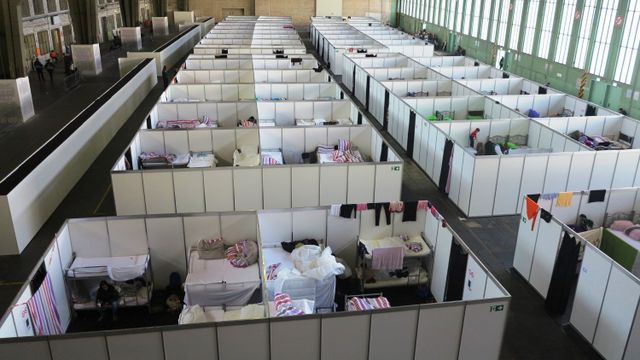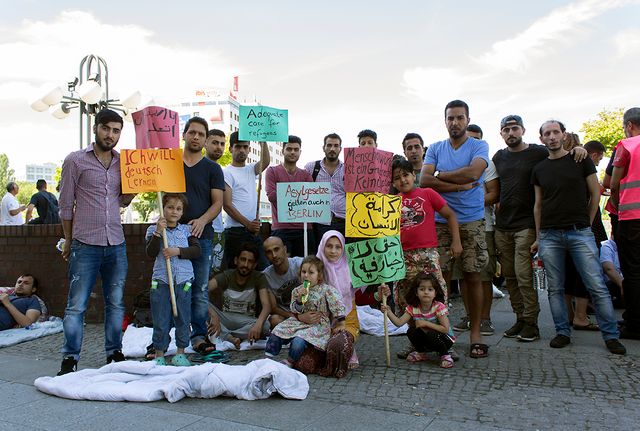Carola Kleinert
In the campaign for the Berlin state elections, the Senate (state executive) is attempting to keep the issue of refugees out of the public eye. Lageso, the state office for health and social services, notorious for its inhumane treatment of refugees and the lines of refugees waiting for days and nights, is currently being moved to a new building out of public view.
The thousands of people who have fled from war and poverty to Berlin continue to face unbearable conditions and are still being housed in mass accommodation centres. They still have to wait for hours in line for appointments and to receive the meagre asylum support benefit, even if those waiting are no longer visible since the Lageso office moved from its location in Moabit to the International Congress Centre building (ICC).
Although the number of refugees arriving in Berlin has dropped sharply due to the EU closing off its borders, many of those who have made it to the city continue to live in unbearable mass camps and sports halls, condemned to inactivity and helplessness.
Nothing has yet come of the grand plans for container villages or the prefabricated buildings permitted under specially reduced building standards. Where sports halls and other large accommodation facilities have been cleared, Lageso has simply redistributed the refugees to other sports halls on the edge of the city, to airport hangars and emergency accommodation at the ICC.
Prestigious buildings are the main ones to be cleared, such as the Horst Korber centre at the Olympic stadium, as well as Trade Hall 24 in preparation for the IFA consumer electronics fair. The several hundred refugees housed there were only informed about their relocation days before.
The ICC is infested with bugs. Decontamination officers must be called out regularly, and aid organisations speak of crying children whose bodies are covered in bite marks. If a state-run kindergarten suffered a similar infestation problem, it would be closed for disinfection; playgrounds would be ordered closed for weeks to combat rat infestations. But the Senate applies other standards when it comes to refugee children.
The hangars at Tempelhof airport are particularly feared for being overcrowded, with a lack of space and loud noise, and their isolation from the external world. Maria Kipp, a spokeswoman for the operator Tamaja GmbH, said recently that there had been an increase in depression, voluntary muteness and attempted suicide.
 Accomodations at Tempelhof
Accomodations at Tempelhof
Desperation is widespread among refugees. Their hopes of a normal existence in Germany, with democratic rights, career and education opportunities have largely been destroyed.
This development is also confirmed by experts in other states. Several studies suggest that between 40 and 50 percent of the refugees arriving in Germany over the past year are now psychologically ill and suffer from conditions like post-traumatic stress disorder (PTSD). Around one in five refugee children suffers from PTSD, but hardly any receive psycho-therapeutic treatment, the federal chamber of psychotherapists revealed last autumn.
But the media remains silent about the fact that such conditions are not only linked to the traumatic experiences of war and flight, but are increasingly due to the situation in the country receiving them, Germany.
In the psychosocial centre in Düsseldorf, someone seeking help described his experience in a reception camp: “We all have to wait in line, like a line of prisoners, you know? Queue up again and wait for food, you know? It was just like in the prison where I came from, waiting for food. … No different. Where am I? And under strict control, strict security measures, everything, you know? … Is this it for the rest of my life?”
The character of many of the accommodation facilities in barracks or former prisons: the large number of people in a room, or in the case of Tempelhof, tents and roofless trade show stands; the raids and deportations; the ban on work and extreme poverty, are all factors contributing to illness, according to therapists.
In Berlin, protests have flared up in recent weeks, particularly among young refugees. In July, several dozen young Iraqis and Syrians protested in front of the Jahn sports hall on the Columbiadamm, which was being cleared. They camped out for several days in the open air and refused to move into the airport hangars as ordered.
 Refugee protest in Berlin
Refugee protest in Berlin
Somewhat later, nine refugees began a hunger strike in front of the old Lageso offices in Moabit. They moved to the ICC, where the payment centre is temporarily located, and carried placards demanding a living space with privacy and access to German lessons to be able to study, for training and access to the labour market. Up to 40 refugees, including families with children, also participated in the protest.
In a vigil at the department of foreign affairs during the past week, 30 refugees demanded that they be allowed to bring their families, who are stuck in war zones, to be reunited in Germany. With the recent restrictions on asylum, the German government has further curtailed the possibilities for Syrian families to be reunited.
Participants in the ICC protest explained to the WSWS why they could no longer tolerate the unbearable conditions without protest.
Mohammed, a young Kurd from Iraq, has only been granted temporary right to remain for six months. He had been in emergency accommodation in Köpenik, “Where we get nothing to eat from 5pm to 8am the next morning.” They are isolated there with nowhere close by to go shopping. He has to travel to the other side of Berlin for German lessons. But he cannot make it back to the accommodation promptly for 5pm for an evening meal, meaning he has to go hungry until the next morning.
He no longer has any desire to return to the accommodation. “The conditions are indescribable, and I have no words for the packaged food.” They were consoled with promises every time, said the 19-year-old, who wants to study. “They say it will be better in a new camp, we will be able to cook for ourselves and not have to wait for hours for a piece of bread. In that way, they encourage us into new accommodation. From Messe South to Tempelhof, and then to Köpenik–always the same.”
Ibrahim reported catastrophic conditions in his emergency accommodation in Spandau, which has only “four toilets for a thousand people.” The rooms are completely overcrowded. “We have no opportunity to find peace for a while.” He and those suffering with him have been resettled five times. In May, 14 families at the Spandau camp refused to move into the airport hangars at Tempelhof and managed to secure entry into a community accommodation centre. However, single men like Ibrahim have no prospect of securing such places. As he has participated in the protest, he has now lost his place in Spandau.
Last Saturday, a tense situation exploded in front of a mass accommodation centre on Storkower Street in Pankow, where mainly Syrian and Iraqi refugees live. A security guard banned a young Syrian from making a speech to a crowd of residents because he was allegedly breaching the peace. A brawl subsequently developed with centre residents, in which pieces of wood, chairs and iron bars were thrown. Two refugees had to be treated in hospital, and two guards suffered mild bruising.
No comments:
Post a Comment